formerly eScholarship Editions


|
|
|
|
Your search for
'Public Policy' in subject
found 65 book(s). | Modify Search | Displaying 41 - 60 of 65 book(s) | |
| 41. | 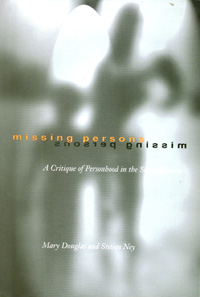 | Title: Missing persons: a critique of the social sciences Author: Douglas, Mary Published: University of California Press, 1998 Subjects: Sociology | Anthropology | Public Policy | Economics and Business Publisher's Description: The Western cultural consensus based on the ideas of free markets and individualism has led many social scientists to consider poverty as a personal experience, a deprivation of material things, and a failure of just distribution. Mary Douglas and Steven Ney find this dominant tradition of social thought about poverty and well-being to be full of contradictions. They argue that the root cause is the impoverished idea of the human person inherited through two centuries of intellectual history, and that two principles, the idea of the solipsist self and the idea of objectivity, cause most of the contradictions.Douglas and Ney state that Economic Man, from its semitechnical niche in eighteenth-century economic theory, has taken over the realms of psychology, consumption, public assistance, political science, and philosophy. They say that by distorting the statistical data presented for policy analysis, the ideas of the solipsist self and objectivity indeed often protect a political bias. The authors propose to correct this by revising the current model of the person. Taking cultural bias into account and giving full play to political dissent, they restore the "persons" who have been missing from the social science debates.Drawing from anthropology, economics, political science, and sociology, the authors set forth a fundamental critique of the social sciences. Their book will find a wide audience among social scientists and will also interest anyone engaged in current discussions of poverty.This book is a copublication with the Russell Sage Foundation. [brief] Similar Items |
| 42. |  | Title: The state and the mass media in Japan, 1918-1945 Author: Kasza, Gregory James Published: University of California Press, 1993 Subjects: Politics | Public Policy | Japan | Asian History Publisher's Description: Gregory Kasza examines state-society relations in interwar Japan through a case study of public policy toward radio, film, newspapers, and magazines. Similar Items |
| 43. |  | Title: The new public management: improving research and policy dialogue Author: Barzelay, Michael Published: University of California Press, 2001 Subjects: Politics | Public Policy | Economics and Business | Social Science | Sociology Publisher's Description: How policymakers should guide, manage, and oversee public bureaucracies is a question that lies at the heart of contemporary debates about government and public administration. In their search for better systems of public management, reformers have looked in particular at the United Kingdom, Australia, and New Zealand. These countries are exemplars of the New Public Management, a term used to describe distinctive new themes, styles, and patterns of public service management. Calling for public management to become a vibrant field of public policy, this valuable book consolidates recent work on the New Public Management and provides a basis for improving research and policy debate on managing public bureaucracies. A copublication with the Russell Sage Foundation [brief] Similar Items |
| 44. |  | Title: A nationality of her own: women, marriage, and the law of citizenship Author: Bredbenner, Candice Lewis 1955- Published: University of California Press, 1998 Subjects: History | United States History | Women's Studies | Law | Public Policy Publisher's Description: In 1907, the federal government declared that any American woman marrying a foreigner had to assume the nationality of her husband, and thereby denationalized thousands of American women. This highly original study follows the dramatic variations in women's nationality rights, citizenship law, and immigration policy in the United States during the late Progressive and interwar years, placing the history and impact of "derivative citizenship" within the broad context of the women's suffrage movement. Making impressive use of primary sources, and utilizing original documents from many leading women's reform organizations, government agencies, Congressional hearings, and federal litigation involving women's naturalization and expatriation, Candice Bredbenner provides a refreshing contemporary feminist perspective on key historical, political, and legal debates relating to citizenship, nationality, political empowerment, and their implications for women's legal status in the United States. This fascinating and well-constructed account contributes profoundly to an important but little-understood aspect of the women's rights movement in twentieth-century America. [brief] Similar Items |
| 45. | 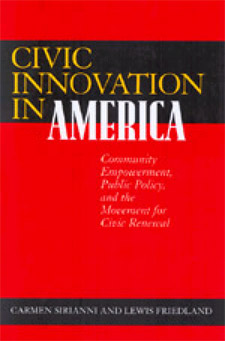 | Title: Civic innovation in America: community empowerment, public policy, and the movement for civic renewal Author: Sirianni, Carmen Published: University of California Press, 2001 Subjects: Politics | Public Policy | Print Media | Environmental Studies | Social Problems Publisher's Description: In this book, two leading experts on community action provide the first scholarly examination of the civic renewal movement that has emerged in the United States in recent decades. Sirianni Friedland examine civic innovation since the 1960s as social learning in four arenas (community organizing/development, civic environmentalism, community health, and public journalism), and they link local efforts to broader networks and to the development of "public policy for democracy." They also explore the emergence of a movement for civic renewal that builds upon the civic movements in these four arenas. In contrast to some recent studies that stress broad indicators of civic decline, this study analyzes innovation as a long process of social learning within specific institutional and policy domains with complex challenges and cross-currents. It draws upon analytical frameworks of social capital, policy learning, organizational learning, regulatory culture, democratic theory, and social movement theory. The study is based upon interviews with more than 400 innovative practitioners, as well as extensive field observation, case study, action research, and historical analysis. [brief] Similar Items |
| 46. |  | Title: Acceptable risk?: making decisions in a toxic environment Author: Clarke, Lee Ben Published: University of California Press, 1989 Subjects: Sociology | Technology and Society | Environmental Studies | Public Policy Publisher's Description: Organizations and modern technology give us much of what we value, but they have also given us Chernobyl, Three Mile Island, and Bhopal. The question at the heart of this paradox is "What is acceptable risk?" Based on his examination of the 1981 contamination of an office building in Binghamton, New York, Lee Clarke's compelling study argues that organizational processes are the key to understanding how some risks rather than others are defined as acceptable. He finds a pattern of decision-making based on relationships among organizations rather than the authority of individuals or single agencies. [brief] Similar Items |
| 47. | 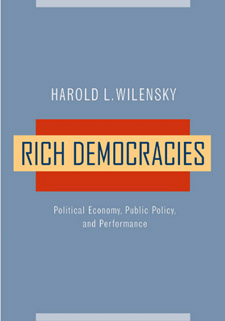 | Title: Rich democracies: political economy, public policy, and performance Author: Wilensky, Harold L Published: University of California Press, 2002 Subjects: Politics | Social Theory | Public Policy | Economics and Business | Sociology Publisher's Description: In this landmark work, the culmination of 30 years of systematic, comprehensive comparison of 19 rich democracies, Wilensky answers two basic questions: (1) What is distinctly modern about modern societies--in what ways are they becoming alike? (2) How do variations in types of political economy shape system performance? He specifies similarities and differences in the structure and interplay of government, political parties, the mass media, industry, labor, professions, agriculture, churches, and voluntary associations. He then demonstrates how differences in bargaining arrangements among these groups lead to contrasting policy profiles and patterns of taxing and spending, which in turn explain a large number of outcomes: economic performance, political legitimacy, equality, job security, safety and risk, real health, the reduction of poverty and environmental threats, and the effectiveness and fairness of regulatory regimes. Drawing on quantitative data and case studies covering the last 50 years and more than 400 interviews he conducted with top decision-makers and advisors, Wilensky provides a richly detailed account of the common social, economic, and labor problems modern governments confront and their contrasting styles of conflict resolution. The result is new light on the likely paths of development of rich democracies as they become richer. Assessing alternative theories, Wilensky offers a powerful critique of such images of modern society as "post-industrial" or "high-tech," "the information age" or the alleged dominance of "globalization." Because he systematically compares all of the rich democracies with at least three million population, Wilensky can specify what is truly exceptional about the United States, what it shares with Britain and Britain abroad (Canada, Australia, New Zealand) and what it shares with all or almost all of the West European democracies, Israel, and Japan. He gives careful attention to which successful social and labor policies are transferable across nations and which are not. Rich Democracies will interest both scholars and practitioners. It combines the perspectives of political economy (the interplay of markets and politics) and political sociology (the social bases of politics). It will be especially useful in courses on comparative political economy, comparative politics, European politics, public policy, political sociology, the welfare state, American government, advanced industrial societies, and industrial relations. [brief] Similar Items |
| 48. |  | Title: Protectors of privilege: red squads and police repression in urban America Author: Donner, Frank J Published: University of California Press, 1990 Subjects: American Studies | United States History | Urban Studies | Public Policy | Sociology Publisher's Description: This landmark exposé of the dark history of repressive police operations in American cities offers a richly detailed account of police misconduct and violations of protected freedoms over the past century. In an incisive examination of undercover work in Chicago, Los Angeles, New York, and Philadelp . . . [more] Similar Items |
| 49. | 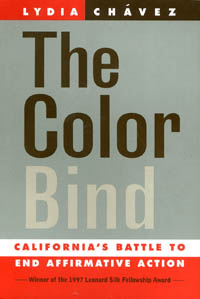 | Title: The color bind: California's battle to end affirmative action Author: Chavez, Lydia 1951- Published: University of California Press, 1998 Subjects: Politics | American Studies | Public Policy | California and the West Publisher's Description: The Color Bind tells the story of how Glynn Custred and Thomas Wood, two unknown academics, decided to write Proposition 209 in 1992 and thereby set in motion a series of events, far beyond their control, destined to transform the legal, political, and everyday meaning of civil rights for the next generation. Going behind the mass media coverage of the initiative, Lydia Chávez narrates the complex underlying motivations and maneuvering of the people, organizations, and political parties involved in the campaign to end affirmative action in California.For the first time, the role of University of California regent Ward Connerly in the campaign - one largely assigned to public relations - is put into perspective. In the course of the book Chávez also provides a rare behind-the-scenes journalistic account of the complex and fascinating workings of the initiative process. Chávez recreates the post-election climate of 1994, when the California Civil Rights Initiative (CCRI) appeared to be the right-time, right-place vehicle for Governor Pete Wilson and other Republican presidential prospects. President Clinton and the state Democratic Party thought the CCRI would splinter the party and jeopardize the upcoming presidential election. The Republicans, who saw the CCRI as a "wedge issue" to use against the Democrats, found to their surprise that the initiative was much more divisive in their own party.Updating her text to include the most current material, Chávez deftly delineates the interplay of competing interests around the CCRI, and explains why the opposition was unsuccessful in its strategy to fight the initiative. Her analysis probes the momentous - and national - implications of this state initiative in shaping the future of affirmative action in this country. [brief] Similar Items |
| 50. | 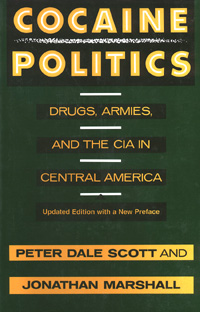 | Title: Cocaine politics: drugs, armies, and the CIA in Central America Author: Scott, Peter Dale Published: University of California Press, 1991 Subjects: Politics | Latin American Studies | Sociology | American Studies | Public Policy Similar Items |
| 51. | 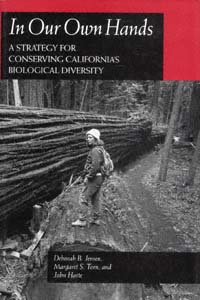 | Title: In our own hands: a strategy for conserving California's biological diversity Author: Jensen, Deborah B Published: University of California Press, 1993 Subjects: Environmental Studies | Ecology | Public Policy | California and the West Publisher's Description: "Biodiversity." As argument over environmental and conservation policy grows more heated in California and throughout the nation, the term has become a buzzword. But what does biodiversity really mean? What really threatens it? Why should we care? In Our Own Hands offers a readable, scientifically sound view of California's biological diversity and what must be done to preserve it. The book will be an invaluable resource for environmental and natural resource specialists, educators, and general readers.Local and global forces threaten California's wetlands, dunes, oak woodlands, and riparian forest habitats - all declining habitats in a rapidly urbanizing, culturally heterogeneous, and politically turbulent state. Always a bellwether, California will be a model for the rest of the United States in its scientific and political solutions to conservation problems. This book proposes the first steps toward a unified national conservation policy for the twenty-first century. [brief] Similar Items |
| 52. | 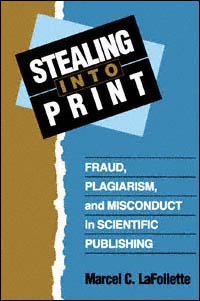 | Title: Stealing into print: fraud, plagiarism, and misconduct in scientific publishing Author: LaFollette, Marcel C. (Marcel Chotkowski) Published: University of California Press, 1992 Subjects: Media Studies | History and Philosophy of Science | Print Media | Public Policy | Science Publisher's Description: False data published by a psychologist influence policies for treating the mentally retarded. A Nobel Prize-winning molecular biologist resigns the presidency of Rockefeller University in the wake of a scandal involving a co-author accused of fabricating data. A university investigating committee declares that almost half the published articles of a promising young radiologist are fraudulent.Incidents like these strike at the heart of the scientific enterprise and shake the confidence of a society accustomed to thinking of scientists as selfless seekers of truth. Marcel LaFollette's long-awaited book gives a penetrating examination of the world of scientific publishing in which such incidents of misconduct take place. Because influential scientific journals have been involved in the controversies, LaFollette focuses on the fragile "peer review" process - the editorial system of seeking pre-publication opinions from experts. She addresses the cultural glorification of science, which, combined with a scientist's thirst for achievement, can seem to make cheating worth the danger. She describes the great risks taken by the accusers - often scholars of less prestige and power than the accused - whom she calls "nemesis figures" for their relentless dedication to uncovering dishonesty.In sober warning, LaFollette notes that impatient calls from Congress, journalists, and taxpayers for greater accountability from scientists have important implications for the entire system of scientific research and communication.Provocative and learned, Stealing Into Print is certain to become the authoritative work on scientific fraud, invaluable to the scientific community, policy makers, and the general public. [brief] Similar Items |
| 53. |  | Title: Disaster hits home: new policy for urban housing recovery Author: Comerio, Mary C Published: University of California Press, 1998 Subjects: Architecture | Urban Studies | Public Policy | Economics and Business | California and the West Publisher's Description: Whenever a major earthquake strikes or a hurricane unleashes its fury, the devastating results fill our television screens and newspapers. Mary C. Comerio is interested in what happens in the weeks and months after such disasters, particularly in the recovery of damaged housing.Through case studies of six recent urban disasters - Hurricane Hugo in South Carolina, Hurricane Andrew in Florida, the Loma Prieta and Northridge earthquakes in California, as well as earthquakes in Mexico City and Kobe, Japan - Comerio demonstrates that several fundamental factors have changed in contemporary urban disasters. The foremost change is in scale, and as more Americans move to the two coasts, future losses will continue to be formidable because of increased development in these high-hazard areas. Moreover, the visibility of disasters in the news media will assure that response efforts remain highly politicized. And finally, the federal government is now expected to be on the scene with personnel, programs, and financial assistance even as private insurance companies are withdrawing disaster coverage from homeowners in earthquake- and hurricane-prone regions.Demonstrating ways that existing recovery systems are inadequate, Comerio proposes a rethinking of what recovery means, a comprehensive revision of the government's role, and more equitable programs for construction financing. She offers new criteria for a housing recovery policy as well as real financial incentives for preparedness, for limiting damage before disasters occur, and for providing a climate where private insurance can work. Her careful analysis makes this book important reading for policymakers, property owners, and anyone involved in disaster mitigation. [brief] Similar Items |
| 54. | 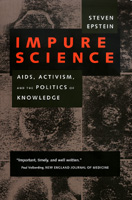 | Title: Impure science: AIDS, activism, and the politics of knowledge Author: Epstein, Steven Published: University of California Press, 1996 Subjects: Social Science | Medicine | Public Policy | History and Philosophy of Science | Sociology Publisher's Description: In the short, turbulent history of AIDS research and treatment, the boundaries between scientist insiders and lay outsiders have been crisscrossed to a degree never before seen in medical history. Steven Epstein's astute and readable investigation focuses on the critical question of "how certainty is constructed or deconstructed," leading us through the views of medical researchers, activists, policy makers, and others to discover how knowledge about AIDS emerges out of what he calls "credibility struggles."Epstein shows the extent to which AIDS research has been a social and political phenomenon and how the AIDS movement has transformed biomedical research practices through its capacity to garner credibility by novel strategies. Epstein finds that nonscientist AIDS activists have gained enough of a voice in the scientific world to shape NIH?sponsored research to a remarkable extent. Because of the blurring of roles and responsibilities, the production of biomedical knowledge about AIDS does not, he says, follow the pathways common to science; indeed, AIDS research can only be understood as a field that is unusually broad, public, and contested. He concludes by analyzing recent moves to democratize biomedicine, arguing that although AIDS activists have set the stage for new challenges to scientific authority, all social movements that seek to democratize expertise face unusual difficulties.Avoiding polemics and accusations, Epstein provides a benchmark account of the AIDS epidemic to date, one that will be as useful to activists, policy makers, and general readers as to sociologists, physicians, and scientists. [brief] Similar Items |
| 55. | 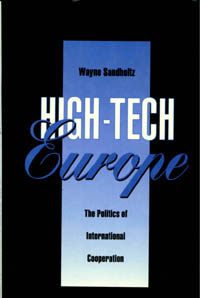 | Title: High-Tech Europe: the politics of international cooperation Author: Sandholtz, Wayne Published: University of California Press, 1992 Subjects: Politics | Public Policy | Economics and Business | Technology and Society Publisher's Description: A study of cooperative efforts in the high-tech industries of Europe. Sandholtz examines why collaboration came late to these countries, how protective walls came down, how countries work together in economically sensitive areas.Governments have recognized for decades the dynamic role played by microelectronics, computers, and telecommunications in the modern economy. Although Europe's deficiencies in these crucial sectors had long been acknowledged, it was not until the 1980s that European nations began collaborating to develop and promote high-tech industries. Their collaboration gives rise to many questions. Why, for example, did the joint efforts come at such a late date rather than in the 1960s or 70s? And how is it possible that they work together in economically sensitive areas? These questions point to fundamental issues in the areas of international cooperation, international institutions, and technology policy.Before the institution of the collaborative programs ESPRIT (European Strategic Programme for Research and Development in Information Technology), RACE (R & D in Advanced Communications-technologies in Europe), and EUREKA (European Research Coordination Agency) in the 1980s, each European country sought its own technological renaissance through protection of national firms behind walls of technical standards, procurement preferences, and research subsidies. Here is a thorough, carefully researched work that examines the breakdown of these walls. It will appeal to political scientists, economists, and scholars of technology and Western Europe interested in the political contours of the high-tech landscape. [brief] Similar Items |
| 56. | 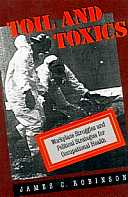 | Title: Toil and toxics: workplace struggles and political strategies for occupational health Author: Robinson, James C. (James Claude) 1953- Published: University of California Press, 1991 Subjects: Environmental Studies | Labor Studies | Sociology | Public Policy | Economics and Business Similar Items |
| 57. | 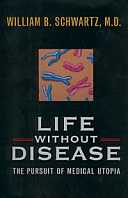 | Title: Life without disease: the pursuit of medical utopia Author: Schwartz, William B 1922- Published: University of California Press, 1998 Subjects: Science | Medicine | Economics and Business | History and Philosophy of Science | Public Policy Publisher's Description: The chaotic state of today's health care is the result of an explosion of effective medical technologies. Rising costs will continue to trouble U.S. health care in the coming decades, but new molecular strategies may eventually contain costs. As life expectancy is dramatically extended by molecular medicine, a growing population of the aged will bring new problems. In the next fifty years genetic intervention will shift the focus of medicine in the United States from repairing the ravages of disease to preventing the onset of disease. Understanding the role of genes in human health, says Dr. William B. Schwartz, is the driving force that will change the direction of medical care, and the age-old dream of life without disease may come close to realization by the middle of the next century. Medical care in 2050 will be vastly more effective, Schwartz maintains, and it may also be less expensive than the resource-intensive procedures such as coronary bypass surgery that medicine relies on today.Schwartz's alluring prospect of a medical utopia raises urgent questions, however. What are the scientific and public policy obstacles that must be overcome if such a goal is to become a reality? Restrictions on access imposed by managed care plans, the corporatization of charitable health care institutions, the increasing numbers of citizens without health insurance, the problems with malpractice insurance, and the threatened Medicare bankruptcy - all are the legacy of medicine's great progress in mastering the human body and society's inability to assimilate that mastery into existing economic, ethical, and legal structures. And if the average American life span is 130 years, a genuine possibility by 2050, what social and economic problems will result?Schwartz examines the forces that have brought us to the current health care state and shows how those same forces will exert themselves in the decades ahead. Focusing on the inextricable link between scientific progress and health policy, he encourages a careful examination of these two forces in order to determine the kind of medical utopia that awaits us. The decisions we make will affect not only our own care, but also the system of care we bequeath to our children. [brief] Similar Items |
| 58. | 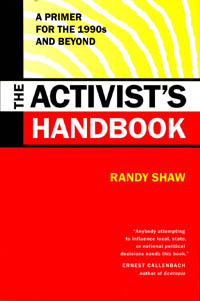 | Title: The activist's handbook: a primer for the 1990s and beyond Author: Shaw, Randy 1956- Published: University of California Press, 1996 Subjects: Politics | Sociology | California and the West | Urban Studies | American Studies | Public Policy Publisher's Description: The Activist's Handbook is a hard-hitting guide to winning social change in the 1990s. Randy Shaw, attorney and longtime activist for urban issues, shows how positive change can still be accomplished despite an increasingly grim political order, if activists employ the strategies set forth in this desperately needed primer.Inspiring "fear and loathing" in politicians, building diverse coalitions, and harnessing the media, the courts, and the electoral process to one's cause are only some of the key tactics Shaw advocates and explains. Central to all social-change activism, Shaw shows, is being proactive: rather than simply reacting to right-wing proposals, activists must develop an agenda and focus their resources on achieving it. The Activist's Handbook details the impact of specific strategies on campaigns across the country: battles over homelessness, the environment, AIDS policies, neighborhood preservation, and school reform among others. Though activist groups can have widely different aims, similar tactics are shown to produce success.Further, the book offers a sophisticated analysis of the American power structure by someone on the front lines. In showing how people can and must make a difference at both local and national levels, this is an indispensable guide not only for activists, but for everyone interested in the future of progressive politics in America. [brief] Similar Items |
| 59. |  | Title: To have and have not: southeast Asian raw materials and the origins of the Pacific War Author: Marshall, Jonathan Published: University of California Press, 1995 Subjects: History | Public Policy | Asian History | Southeast Asia | Economics and Business | Politics Publisher's Description: Jonathan Marshall makes a provocative statement: it was not ideological or national security considerations that led the United States into war with Japan in 1941. Instead, he argues, it was a struggle for access to Southeast Asia's vast storehouse of commodities - rubber, oil, and tin - that drew the U.S. into the conflict. Boldly departing from conventional wisdom, Marshall reexamines the political landscape of the time and recreates the mounting tension and fear that gripped U.S. officials in the months before the war.Unusual in its extensive use of previously ignored documents and studies, this work records the dilemmas of the Roosevelt administration: it initially hoped to avoid conflict with Japan and, after many diplomatic overtures, it came to see war as inevitable. Marshall also explores the ways that international conflicts often stem from rivalries over land, food, energy, and industry. His insights into "resource war," the competition for essential commodities, will shed new light on U.S. involvement in other conflicts - notably in Vietnam and the Persian Gulf. [brief] Similar Items |
| 60. |  | Title: Engineering trouble: biotechnology and its discontents Author: Schurman, Rachel Published: University of California Press, 2003 Subjects: Sociology | Conservation | EcologyEvolutionEnvironment | Technology and Society | Agriculture | Technology | Public Policy Publisher's Description: Talk of genetically engineered organisms (GEOs) has moved from the hushed corridors of life science corporations to the front pages of the world's major newspapers. As Europeans began rejecting genetically engineered foods in the marketplace, the StarLink corn incident exploded in the United States and farmers set fire to genetically modified crops in India. Citizens and consumers have become increasingly aware of and troubled by the issues surrounding these new technologies. Considering cases from agriculture, food, forestry, and pharmaceuticals, this book examines some of the most pressing questions raised by genetic engineering. What determines whether GEOs enter the food supply, and how are such decisions being made? How is the biotechnology industry using its power to reshape food, fiber, and pharmaceutical production, and how are citizen-activists challenging these initiatives? And what are the social and political consequences of global differences over GEOs? [brief] Similar Items |